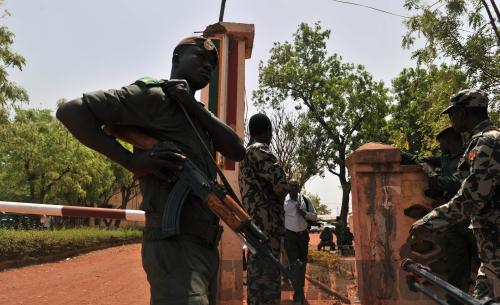|
 |
|
RESOLVED: The Mali coup fails after AU and ECOWAS pressure |
"Is there a coup in Mali?"
That was the telling question that landed on the official Twitter account of Mali's ousted leader Amadou Toumani Toure on March 21. It sounded outrageous, given that the country last had a coup two decades ago.
The president was bamboozled.
"Could you check with your source? There is no coup in Mali. There's just a mutiny in the garrison of Kati," Toure tweeted in response to the query from his handle @PresidenceMali.
Prior to that query, the landlocked West African country had been reeling from a series of demonstrations and protests over the poorly equipped troops, who had been sent to quell a rebellion by a Tuareg separatist movement in the north of the country.
Many soldiers, drawn from the south, were dying at the hands of the separatists, angering their kinsmen back home. The dissatisfaction in the public spawned a mutiny in the military. The president had no idea that a coup was imminent when he replied to the Twitter query.
A day later a band of low-ranking mutineers led by a U.S.-trained Captain Amadou Sanogo toppled the government, sending their clueless commander-in-chief into hiding. The bane of the coup leaders was that the government had failed to provide them with modern weaponry to fight the Tuareg separatists in the north.
The irony is that the coup took place just as the African Union Peace and Security Council was winding up a crucial meeting in Mali's capital, Bamako.
The AU Commission had called the meeting to explore possible interventions in some of the troubled regions of the continent including the raging rebellion in the Republic of Mali. The continental dignitaries were trapped.
Collective pressure
Among those trapped were Kenya's then Minister of Foreign Affairs, Moses Wetangula. Kenya is a member of the AU Peace and Security Council.
In a brief Facebook post, Wetangula let the continent know about the surprise coup and about his dire straits.
"A coup d'etat has taken place in Mali as I was about to leave for the airport. [I] may not be able to leave. [The] airspace is closed. Pray for me," said Wetangula, who, upon return to Nairobi, five days after the coup, was transferred from the Foreign Affairs Ministry to the Trade Ministry in Kenya's coalition cabinet.
With dignitaries holed up in their hotels, the coup leaders got what they wanted: global attention to the rebellion in the north of the country, a rebellion which began on January 17. And the attention was fast and furious.
The AU Commission Chair Jean Ping and the UN Secretary General Ban Ki-moon weighed in. They asked Sanogo and his team to hand over power to a civilian government and to quickly let the trapped dignitaries go home.
But it was not only the UN and the AU that were piling pressure on Sanogo. The West Africa trading bloc, the Economic Community of West African States (ECOWAS), embarrassed by the disgrace of a coup in what was essentially the pearl of democracy in the region, also weighed in with sanctions.
It had asked all of Mali's neighbors to close their borders to any form of trade amid other sanctions.
With seven neighbors the coup leaders had no option but to stand down.
Interim leader
Having let loose the dignitaries, ECOWAS tightened the screws to have the military cede power to a civilian government.
And this they did in the first week of April, but with a demand that the ousted president had to resign first. The fugitive president came out of hiding and announced his resignation.
The plan as per Mali's Constitution calls for the head of its parliament to take over government, name a prime minister, form a government and then organize elections.
The head of parliament, Diouncounda Traore, a 70-year-old former mathematics teacher and trade unionist, was sworn in on April 12, by Mali's Supreme Court President Nouhoum Tapily and almost immediately called for the cessation of violence in the north.
Traore must ensure that there is an election not later than 40 days after his swearing in, as per the constitution.
|